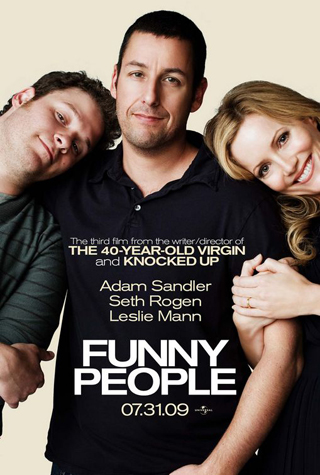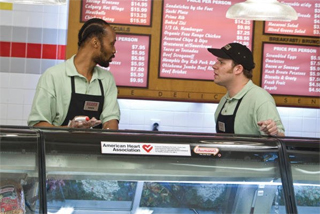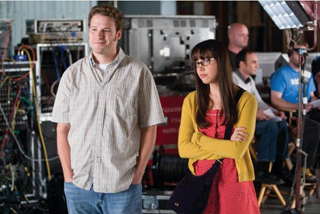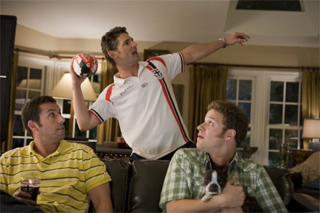|
Funny
People Imagine
a world where Adam Sandler is a famous and ludicrously rich
comedian. (I’ll give you a minute.) Now imagine he’s
diagnosed with a severe, nearly-guaranteed-to-be-terminal
disease and is forced to reexamine his life and the decisions
he’s made about his personal relationships and the
resulting isolation. Now imagine that, after squaring up
his affairs and coming to terms with his life, the experimental
drugs he was prescribed actually work and he’s given
a second chance at life. Lastly, imagine that his attitude
regresses and then the story goes on for ANOTHER ENTIRE
HOUR. I give you Funny People, a really good movie
that very nearly wears out its welcome.
Funny
People is the third movie written and directed by Judd
Apatow and is essentially his rumination about what makes
him and his comedian friends tick. It is Apatow’s
most thematically mature work to date and looks very good,
making excellent use of Academy Award winning cinematographer,
Janusz Kaminski.
The
story follows George Marshall (Adam Sandler), a Sandler-like
comedian who has become isolated in his fame and popularity.
After being diagnosed with an almost-certainly fatal disease
he takes the inexperienced, yet potentially funny, Ira Wright
(Seth Rogen) under his wing to write jokes for him and act
as his assistant. George ends up examining his life and
friendships to make himself a happier person and then threatens
to make his way back to asshole-ery again once he learns
he’s well.
The
strongest, funniest, and most enjoyable section of the movie
comes in the first two thirds of the almost two and a half
hour running time. This section deals largely with Ira’s
efforts as a struggling comedian along side his other actor
and comedian friends and roommates (Jason Schwartzman and
Jonah Hill) and his relationship with George.
Sandler
gives a captivating performance as George. He gives the
character enough bitterness, resentment, and depth to make
him interesting, but not so much as to make him repugnant.
Each of his selfish, resentful outbursts has the undercurrent
of desperately wanting companionship. It’s a tight
line that Sandler walks well.
The
fact of the matter is that all the growth among characters
in the movie is in small, almost imperceptible steps, though
the subtleties are well-played. Overall there’s as
much character growth going on in Funny People
as there is in a Chekov play.
The
movie pays homage to stand-up humor and all its raunchy,
insecure, fraternity-like language and behavior. (But isn’t
insecurity and self-degradation the basis of so much good
stand-up humor?) They talk about Dick more than a Richard
Nixon tribute. They talk about the size of each other’s
members more than a judging panel at a county fair. It’s
funny for a while, but, as James Taylor asks Ira early in
the movie, “Do you guys ever get tired of talking
about your dicks?” I think yes.
I predict that if this movie takes off it
will have the same effect that so many nights at the comedy
club do: The “I Can Do That” Effect. If this
is a big hit that everybody ends seeing, a common occurrence
among Apatow movies, get ready for some pretty awkward stand-up
comedy at the amateur night at your local comedy club.
It’s always inexplicably fun to see
so many big name stars playing themselves, and this movie
has a veritable who’s who of famous comedians who
must have owed Sandler or Apatow a favor or just had a few
hours free on a Wednesday night. The comedian cameos run
the gamut from established veterans like Paul Riser and
Norm MacDonald to fresh-faced internet comedians like Bo
Burnham. (He’s Bo, yo.) There’s even a hilarious
appearance from the rapper Eminem, which begs the question:
When Eminem tells you you’ve f’ed up big time,
is that a good thing, or a bad thing?
Judd
Apatow still doesn’t know what to do with female characters,
but he is getting better. There are only two notable female
characters in the movie. One woman, the object of Ira’s
affection, Daisy (Aubrey Plaza), is a fellow aspiring comic
who defends her right to sleep with guys just because they’re
famous, even if she does regret it afterwards. It’s
an argument for free choice, true, but it’s not exactly
flattering.
The
other female character, Laura (Leslie Mann), is George’s
old flame who goes from coolly pushing him away to weepy
acceptance when she learns he’s sick. Her indecisiveness
and her desire to have it all become the engine behind the
movie’s overlong and far-flung third act. Laura ends
up being one of the most mature characters in the movie,
but it takes her an awfully long time to get there.
This
brings up what relegates Funny People to being
a really good, but not great movie: Its third act. After
George learns he’s well, he leaves the familiar confines
of L.A. to try to win back his now-married former fiancée,
Laura, who is now married to Clarke (Eric Bana), has two
daughters, and is living in the Bay Area.
The
audience is stuck shaking their heads at George’s
actions and scratching their heads at Laura’s wishy-washy
attitude toward her marriage, family, and life. Additionally,
Bana’s portrayal of Clarke turns him into an easily-cuckolded,
short-sighted, ultra-manly-in-a-condescending-Eastern-philosophy-sort-of-way,
Australian caricature among characters that were modestly
well-rounded before, but become starkly realistic by contrast.
The episode works to inexplicably turn the audience against
characters we’ve been coming to sympathize with and
like for the past hour and half.
Funny
People marks a definite step forward for Judd Apatow,
has an outstanding performance from Adam Sandler (even if
he is playing a ruder version of himself), and benefits
from a solid supporting cast. The movie is crippled by a
super-long running time and a third act that seems to change
moods and works to distance the audience from characters
they’d grown close to.
The
flaws, however, do not come even close to ruining the experience
and the movie is definitely worth a look. I’d say
the fate of serious-but-not-too-serious comedy is still
safe for now in the hands of the people who made this movie,
even if they do tend to talk about their dicks.
A lot.
|









